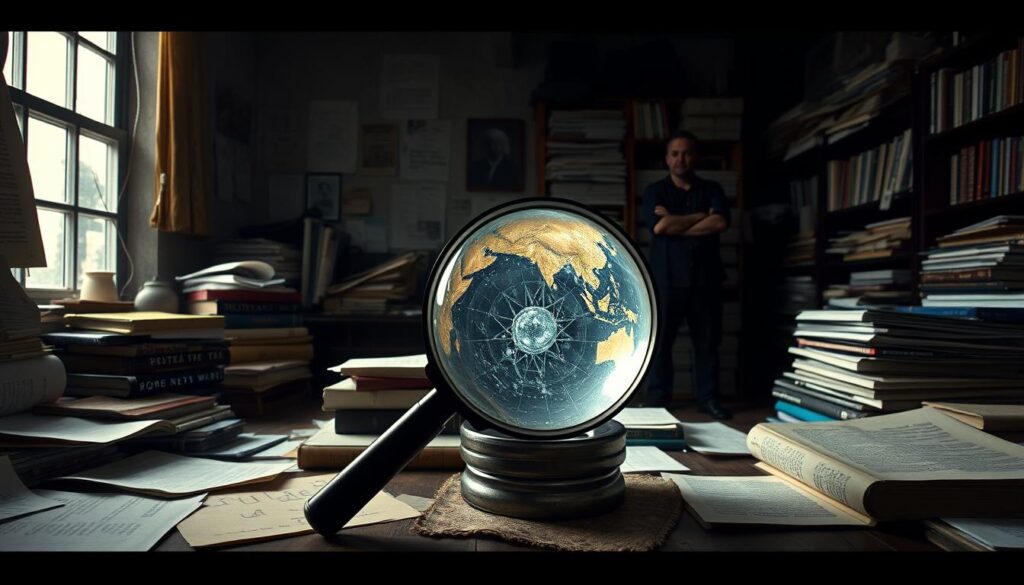Ever had a dream that came true or a gut feeling about something that happened? That might be precognition, a phenomenon that has puzzled people for ages. It’s a form of extrasensory perception (ESP) where you can see or predict the future before it happens.
People have different opinions about precognitive abilities. Some think it’s real and amazing, while others say it’s just chance or memory tricks. Despite the debate, the idea of precognition still fascinates many, as seen in movies and TV shows.
The study of precognition has a rich history. It spans from ancient beliefs to today’s scientific research. While some doubt its existence, others believe it’s worth exploring further.
In this article, we’ll dive into what precognition is, its types, and its history. We’ll also look at scientific studies, theories, and the skepticism surrounding it. Whether you believe in the sixth sense or are curious, this article aims to give you a deep look into precognitive abilities.
Key Takeaways
- Precognition is the alleged ability to perceive or predict future events before they occur.
- Views on precognitive abilities range from enthusiastic acceptance to skeptical dismissal.
- The study of precognition has a long history, from ancient beliefs to modern scientific investigations.
- Theories attempting to explain precognition include psi theories and quantum entanglement.
- Skeptics argue that evidence for precognition is insufficient, while proponents maintain its validity.
The Concept of Precognition
Precognition is a fascinating part of psychic abilities that has long intrigued people. It’s about seeing or predicting future events before they happen. This idea makes us question our understanding of time and how things happen.
Defining Precognition
Precognition can be seen in many ways, like vivid dreams or sudden feelings about what’s to come. It’s like knowing something before it happens. A story from January 2018 tells of Victor Amole, who dreamed of lottery numbers and won four times, each time $100,000.
This goes beyond just luck. It shows a deep link between our minds and time. Many people have had experiences where they knew something was going to happen before it did.
Distinguishing Precognition from Other Psychic Phenomena
Precognition is different from other psychic abilities like telepathy and clairvoyance. Telepathy is about sharing thoughts without words. Clairvoyance is seeing or knowing things through extrasensory means. Fortune telling and divination involve interpreting signs to guess the future.
Precognition is a natural ability that doesn’t need tools or magic. It’s a personal experience of knowing what’s to come. A 2012 study showed that our bodies can change before we see something scary or exciting. This shows we might know something is coming before it happens.
| Psychic Phenomenon | Definition |
|---|---|
| Precognition | The alleged ability to perceive future events before they occur |
| Telepathy | The supposed communication of thoughts or feelings between individuals without the use of traditional sensory channels |
| Clairvoyance | The ability to gain information about objects, people, or events through extrasensory perception |
| Fortune Telling | The practice of predicting future events, often through the interpretation of signs or symbols |
Exploring precognition shows it’s a topic that interests both believers and skeptics. From old prophecies to today’s premonitions, seeing the future fascinates us. By looking into the precognitive meaning, we start to understand the mysteries of time and our minds.
Types of Precognitive Abilities
Precognitive abilities show us glimpses of the future in dreams, visions, and instincts. These experiences offer insights that help us make choices or stay safe. They are a way to see what’s coming.
Precognitive Dreams
Dreams are a common way to see the future. These dreams are often vivid and different from regular dreams. They can tell us about future events, like conversations or big changes.
Many people feel déjà vu when a dream comes true. It’s like they’ve seen it before.
Precognitive Visions
Visions happen when we’re awake and can be very clear or symbolic. They can feel like a sudden insight or a picture in our mind. Some people even paint what they see.
Precognitive Instincts
Instincts are a gut feeling about the future or danger. They can make us want to act quickly or feel uneasy. These instincts help us sense what’s coming or spot trouble.
| Precognitive Ability | Description |
|---|---|
| Precognitive Dreams | Vivid and lurid dreams that provide detailed information about future events |
| Precognitive Visions | Conscious experiences of future events, can be accurate or symbolic |
| Precognitive Instincts | Intuitive insights that provide a sense of knowing about significant future events or dangers |
By understanding and using these abilities, we can see the future more clearly. This helps us make better choices and face life’s challenges with confidence.
Historical Perspectives on Precognition
The history of precognition is as old as human civilization. Ancient beliefs and religious views have always included the idea of seeing the future. Many people have believed in precognition, seeing the future in dreams and trance states.
In many cultures and religions, precognition is a key part of their beliefs. In Judaism, some dreams are thought to carry prophetic messages, like Joseph’s dreams in the Book of Genesis. These dreams are seen as messages from God, giving glimpses into the future.
Precognition in Religious Contexts
In Buddhism, dreams are seen as creations of the mind. Dreams warning of danger or good news are most important. Buddhist teachings say that advanced spiritual practices can help see the future through dreams or meditation.
Early studies on precognition started in the 17th century. For example, missionary Fr. P. Boilat reported an African witch-doctor correctly answering an unspoken question. This suggested the possibility of precognitive abilities.
“Dreams are today’s answers to tomorrow’s questions.” – Edgar Cayce
Surveys show that between a quarter and a third of people report a precognitive event. About 75% of these happen in dreams. This shows how deeply precognition is rooted in human experience and fascinates many across cultures and time.
Scientific Investigation of Precognition
In the early 20th century, scientists started to really look into precognition. They wanted to know what it was and how it worked.
Early 20th Century Research
J.W. Dunne, a British engineer, wrote “An Experiment with Time” in 1927. He shared his own experiences with precognitive dreams. Dunne believed these dreams were more common than people thought.
Dunne’s book made scientists even more curious about precognition. Paul Kiritsis built on Dunne’s ideas in his 2021 book. Kiritsis did a study in 2014 with 15 people who kept track of their dreams and waking life.
J.W. Dunne’s “An Experiment with Time”
Dunne’s book was a big deal because it linked dreams to the future. He thought dreams could show us things that haven’t happened yet. He believed this was more common than we thought.
“The dream is a master-key which unlocks many doors of the mind.”
– J.W. Dunne, “An Experiment with Time”
Dunne’s work inspired more research into precognition. It set the stage for more detailed studies in the years that followed.
The Rhine Experiments at Duke University
In the 1930s, Joseph Banks Rhine and Louisa E. Rhine started something big at Duke University. They created the Parapsychology Laboratory. There, they did lots of experiments on precognition and other psi phenomena.
| Researcher | Institution | Research Focus |
|---|---|---|
| Joseph Banks Rhine | Duke University | Precognition, ESP |
| Louisa E. Rhine | Duke University | Precognition, ESP |
The Rhines used special tests to see if people could predict the future. Their work was important, even if some of it was later questioned. It helped make precognition a topic for serious scientific study.
Theories Explaining Precognition
Precognition has always been a mystery to many. Some think it’s just chance or bad research. But others have come up with theories to explain how we might see the future. These ideas range from paranormal beliefs to scientific theories based on quantum mechanics and psi phenomena.
Psi Theories
Psi theories say precognition is a form of extrasensory perception (ESP). They believe our minds can see beyond time and space. These theories claim that precognition is real and can’t be explained by science.
Studies show that people who believe in psychic powers are more open to suggestions. They also tend to see connections where none exist. Research links this to a certain personality type and even using psychedelic drugs.
Quantum Entanglement and Precognition
Some scientists think quantum entanglement might be linked to precognition. Quantum entanglement is when particles are so connected that changing one instantly affects the other, no matter the distance. This idea sparks the thought that entangled particles could send information through time, explaining precognitive experiences.
| Theory | Key Concepts | Implications |
|---|---|---|
| Psi Theories | Extrasensory perception, latent abilities | Precognition as a genuine phenomenon |
| Quantum Entanglement | Entangled particles, information transmission | Potential explanation for precognitive experiences |
Even though these theories are interesting, scientists are still unsure about precognition. If psychic powers exist, it would be hard to study them. More research is needed to understand precognition and its mysteries.
Skepticism and Critiques of Precognition
The idea of precognition has faced skepticism from scientists. This is because there’s not enough scientific evidence. Critics say that people might remember correct predictions but forget the wrong ones. This makes it seem like they have precognitive abilities.
Also, precognition goes against our understanding of causality and time. It seems to say that the future can affect the present. This idea is hard for scientists to accept. Studies on precognition have been criticized for methodological flaws.

Years ago, Daryl J. Bem published a paper on precognition. It sparked a lot of skepticism and critiques. Bem did nine experiments with over 1,000 people to see if precognition exists. His findings were interesting, but others have struggled to get the same results.
Even with all the debates, many people still believe in precognition. A recent survey found that one in four Americans believe in it. It’s interesting that believing in precognition might help people feel more in control when they’re stressed or have little control over their lives.
| Experiment | Participants | Findings |
|---|---|---|
| Experiment 1 | 87 | People feeling low in control reported greater belief in precognition |
| Experiment 2 | 53 | Belief in precognition increases perceived control, even with scientific evidence |
| Experiment 3 | 132 | Belief in precognition helps people feel more in control when they have little control |
The debate on precognition is ongoing. Scientists need to do more careful studies to find solid evidence. Until then, the skepticism and critiques will keep going.
Developing Precognitive Abilities
For those looking to tap into their precognitive potential, several practices can help. Meditation, mindfulness, dream journaling, and intuition training are key. These practices can lead to a journey of developing precognition and growing spiritual awareness.
Meditation and Mindfulness
Meditation and mindfulness are powerful tools for psychic development. They quiet the mind, making it easier to receive intuitive insights and precognitive messages. Regular meditation brings inner peace and clarity, helping to receive precognitive information.
Dream Journaling
Dreams can be a gateway to precognitive experiences. Keeping a dream journal helps identify precognitive elements in dreams. Over time, patterns and symbols may emerge, offering clues about the future. Here are some dream journaling tips:
- Keep your journal and a pen beside your bed for easy access upon waking
- Record as many details as possible, including emotions and sensations
- Reflect on your dreams and look for recurring themes or symbols
Intuition Training
Strengthening one’s intuitive skills is crucial for developing precognition. Learning to trust gut feelings and hunches helps recognize intuitive messages. Intuition training may involve:
- Practicing mindfulness to become more attuned to bodily sensations and emotions
- Engaging in exercises designed to enhance intuitive decision-making
- Trusting and acting upon intuitive promptings, even in small, everyday situations
By dedicating themselves to these practices, individuals can see their precognitive abilities grow. With patience, persistence, and an open mind, anyone can deepen their intuitive wisdom and unlock precognitive insights.
Precognitive Experiences in Everyday Life
Many people say they have precognitive experiences in their daily lives. These can be dreams or sudden hunches. They range from feeling like you’ve been somewhere before to clear warnings about what’s coming.
Even though scientists are still unsure, many stories suggest our intuition plays a big role. It’s like we have a sixth sense guiding us.
Studies show that 17% to 38% of people have had precognitive dreams. More than half of everyone thinks these dreams are real. Women tend to believe in and have these dreams more than men.
Things like what we believe, our culture, and big life changes can make these dreams happen. Stress, near-death experiences, and how we sleep can also play a part.

Precognitive Dreams and Déjà Vu
Precognitive dreams are often very vivid and leave a strong impression. They might show scenes or events that later happen in real life. This can make you feel like you’ve been somewhere before, known as déjà vu.
Déjà vu is when you feel like you’ve already experienced something. It can be due to memory issues or our subconscious mind. But some think it might be a sign of psychic intuition or glimpses into other realities.
Precognitive Warnings and Hunches
People also get precognitive warnings or hunches about the future. These can be a feeling of unease or a clear warning of danger. Some say these instincts helped them avoid accidents or make big decisions.
| Precognitive Experience | Percentage of People |
|---|---|
| Precognitive Dreaming | 17% to 38% |
| Belief in Precognitive Dreaming | More than 50% |
| Anomalous Dreams (in a survey of 1,000 individuals) | 33% to 50% |
Even though scientists debate it, many people have these experiences. This suggests our intuition might be more powerful than we think. As we learn more, it’s important to keep an open mind and look for scientific answers.
Conclusion
Precognition is a mysterious topic that sparks debate in the paranormal world. Despite no solid scientific proof, many are drawn to it. This shows our deep interest in understanding the human mind and its powers.
Studies on precognitive dreams and presentiment have shown interesting findings. They suggest some people might sense future events better than others. This has sparked curiosity and research into these abilities.
But, scientists are not all convinced about precognition. Critics say there are flaws in the research and not enough consistent results. The way journals pick what to publish also adds to the confusion.
Still, researchers keep looking into precognition. They aim to find out how it works. This could help us understand more about our minds and how we see time.
As we learn more about precognition, we need to stay open-minded and critical. Using strong science and new ways to study it can help us understand it better. Whether it’s real or just our minds playing tricks, exploring precognition could teach us a lot about ourselves.

